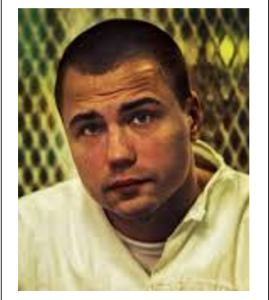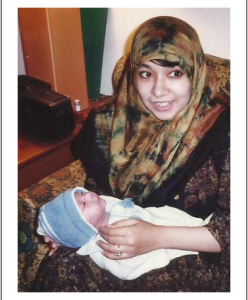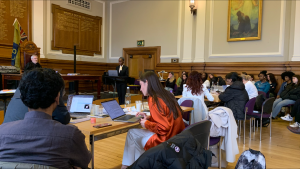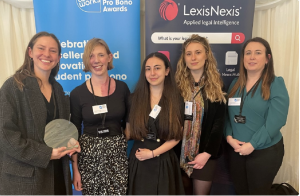We are thrilled to announce the first of many annual summer internship programmes with Goldsmiths Distinguished Visiting Professor Clive Stafford Smith OBE.
The Department of Law will provide 12 x £500 scholarships to support the scheme.
We are grateful to Prof Stafford-Smith for volunteering his time and expertise with the aim of offering the unique opportunity to our students to work on a range of live projects relating to counter-terrorism and human rights.
We are very pleased with the diversity of the group of students who have successfully applied – ten of the twelve are BAME, and seven women. We also opened the process up to various other departments, reflecting Goldsmiths’ commitment to interdepartmental coordination. Two undergraduates are from the Department of Media, Communications and Cultural Studies and one student is doing an MS in Filmmaking.
Clive’s ten-week internship includes students from Bristol, Cambridge, Oxford, Canterbury, Leicester, Edinburgh, Birmingham and Queens College, so our students will work with their peers from other universities, some doing linguistics, some studying sociology. In addition, the Goldsmiths students with work alongside Clive’s apprentices from last year who are spending the summer in Alabama and Texas – the hope being that some of our cohort will follow in their footsteps to work on the ground in the US next summer.
The students will begin with a two-day introduction in Bristol on June 19-20, where Clive will run them through the various projects they will work on. For example, all the students will assemble a Case Theory Memo for a death penalty case where it seems likely that an innocent prisoner was executed, based on a review of the entire record that Clive has already laboriously assembled from several states. This means they will get to see an entire capital case from start to finish. It will ultimately lead to a film or a podcast, but only after a second year where – as with three of last year’s cases from Texas, and two from Alabama – students do the follow-up factual investigation.

Teenager Clinton Young is on death row
The students will also take part in factual and legal research for two clients still facing execution, and on June 19th, they will be able to speak directly to one (Clinton Young) to hear what it meant for a teenager to be sent to death row.
When it comes to the Guantánamo Bay clients, the advocacy is very broad. Several students have already volunteered to help Ahmed Rabbani (ISN 1461) with his Guantánamo Cook Book (and two of the 2022 students will be demonstrating some of Ahmed’s recipes at the introduction session). They will also be seeking to replicate Ahmed’s recent Karachi art show for Yemeni prisoner Khalid Qassim (ISN 242), another talented artist. And they will work on seeking compensation for the oldest Guantánamo prisoner, Saifullah Paracha (ISN 1094), an innocent Pakistani businessman who was kidnapped from Thailand.

Dr. Fowzia Siddiqui
They will also hear from Dr. Fowzia Siddiqui, the sister of Pakistani Dr. Aafia Siddiqui who is the only woman to suffer the US rendition-to-torture programme in the wake of 9/11. Clive recently took on her case, and several students have already indicated their interest in helping secure her justice – she was originally sold to the US for a $55,000 bounty, and abducted with her three children from Karachi in 2003. Her youngest (Suleiman, an infant, right) was killed; her daughter Maryam (3) was forcibly fostered into an American family for 5 years; and her son Ahmed (5) was similarly held for half a decade. Aafia herself was taken to Bagram Air Force Base in Afghanistan where she was subjected to torture. She is now facing 86 years in a federal prison in Texas.
A major academic project that will run through the summer, called Louisiana v. London, looks at the flaws in the contemporary UK legal system as they are reflected by the American Revolutionaries’ complaints in the US constitution and Bill of Rights. Some students will also work on ‘Constitutions’ for schools and universities that can help illuminate the benefits from a written structure.
Building on the recent ‘Generation on Trial’ project held at Goldsmiths, where Sir Nick Clegg was tried before a panel of Lewisham secondary students for the ‘crime’ of tripling student fees, the summer internship will help with the development of other ‘trials’ involving contemporary issues such as climate change, asylum seekers, and the monarchy.

Generation on Trial project: the trial of Sir Nick Clegg
Over the summer our students will have the opportunity to write, or make short social media films, on a range of legal and social science issues.
On each Tuesday of the ten-week programme, the students will assemble virtually or in person for an interactive lecture by Clive, or one of his guests, on a wide range of legal, advocacy and moral issues. If they wish, the students will also work one-on-one with Clive to identify their particular talents and passion, with a view to constructing as rewarding a career as he has had.
We hope that at the end of the summer the students will return to Goldsmiths fired up with knowledge and inspiration to continue their individual paths towards a life that is aimed at improving the lives of those around them.
